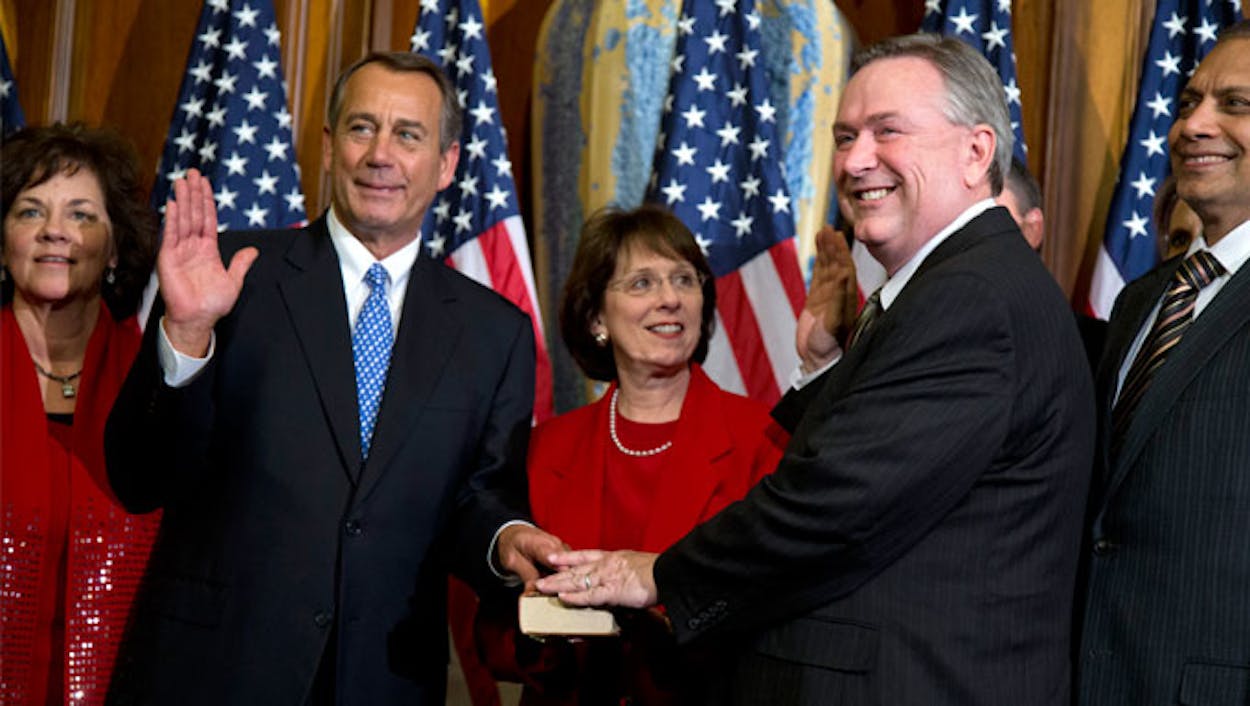Rarely has a Republican explained his support for the Second Amendment or his commitment to the pro-life cause as succinctly as Steve Stockman, a U.S. representative from Texas, who required only eight words to do both: “If babies had guns, they wouldn’t be aborted.”
It wasn’t an off-the-cuff comment; it was his campaign’s bumper sticker in 2012. As a matter of modal logic, it’s incontrovertible; the posited baby, being a baby, is accordingly neither aborted nor at any further risk of that contingency. As a policy prescription, though, it’s totally, blissfully absurd. And this week, it helps explain two additional things about Stockman: why he’s challenging John Cornyn for the 2014 Republican Senate nomination and why he won’t succeed.
Let’s start with the second prediction. Texas’s primary voters are, as a group, conservative rather than extreme. Think back to the state’s 2012 primaries, which were held in May of that year. It was already clear that Mitt Romney would be the Republican presidential nominee. That being the case, there was no reason not to cast a protest vote against him, and sure enough, the most philosophically coherent swath of internal dissidents did so; Ron Paul pulled 12 percent of the vote, right in line with his national average of 11 percent. Romney, however, carried 69 percent of the primary voters. Some of those voters were no doubt being stoical. But still: it’s not a result that suggests a rabidly far-right primary electorate.
Stockman, to be fair, is not just a guy with a website. He’s a guy with a website and, as of 2012, a seat in Congress. He’s actually won congressional races twice, having been elected to one term in 1994; he is the rare tea party firebrand who predates the tea party movement. That distinguishes him from the handful of other activists who have already announced their intention to run for Senate in 2014, and Stockman will be Cornyn’s most serious primary challenger. Cornyn is, however, hardly a RINO. In February the National Journal ranked him as the second-most-conservative member of the Senate, based on its analysis of the votes cast in the 112th Congress.
RELATED: Brian D. Sweany’s recent interview with Cornyn.
It’s an enjoyable historical irony that Cornyn is partly responsible for the situation he now finds himself in. Shortly after being elected attorney general of Texas, in 1998, he decided that his new office should include another lawyer, a solicitor general, who would lead the state’s litigation efforts. A number of state attorney generals were carving out such a post at the time, and Cornyn probably didn’t give it much thought after being elected to the U.S. Senate in 2002.
It was, however, a decision that would prove to have profound implications for Texas politics, and for Cornyn personally. His successor, Greg Abbott, inherited the chance to hire a solicitor general. He settled on a promising young lawyer named Ted Cruz. When Cruz ran for Senate, in 2012, he had never held elected office. His “proven record” was largely drawn from his work as solicitor general—work he would never have done, presumably, had Cornyn not created the job. Again, it’s a bit of historical irony, given all the headaches Cruz has caused Cornyn this year. By winning the Senate nomination, in an epic upset over Texas’s incumbent lieutenant governor, Cruz apparently created an impression, among the party grassroots, that no incumbent Republican should be left unscrutinized. And by serving alongside the comparatively subdued Cornyn, Cruz apparently sent a message: go after this guy specifically.
Or at least this is the message that Stockman seems to have taken from the situation. “John Cornyn wakes up every morning and works to make the Senate a more liberal place,” he wrote on his website, in a statement announcing the Senate campaign. “Liberal John Cornyn betrayed Ted Cruz, and you, by voting to fund Obamacare.”
RELATED: Mimi Swartz’s profile of Steve Stockman from his first stint in Congress.
This is, for Cornyn, a best-case scenario. For months, conservative activists have been grumbling about his supposed moderation, and warning that he could be vulnerable to a serious primary challenge. Now he has one. There is little danger that Stockman will win, but by entering the race, he has effectively precluded any additional challenge from the right.
Stockman has also given Cornyn a chance to confirm his credentials. For much of his career, the senator has been overshadowed by other Texans: by George W. Bush, who was president, which obviously trumps senator; by Phil Gramm, his influential predecessor in the Senate seat; by Rick Perry, the puckish and oddly irrepressible governor; and most recently by the full-time phenomenon that is Ted Cruz. Compared to this crew, Cornyn has often seemed like a placeholder. He certainly looks like a senator from Texas, but most Texans couldn’t tell you more about him than that.
Yet Cornyn’s political career is not an indistinguished one. He is one of the Texas Republicans who helped clinch the state’s deep-red status. In the 1998 campaign, he reclaimed the attorney general’s seat for the Republicans by defeating a Democrat, Jim Mattox, who had previously held that post. He won the Senate seat in 2002 by posting a twelve-point margin over Ron Kirk, the popular former mayor of Dallas, at a time when it was not yet routine for Texas Republicans to beat the Democrats by double-digit victories. And Cornyn is, as minority whip, the second-ranked Republican in the Senate. There’s a possibility that he could return to the Senate, after the 2014 elections, as the majority leader. But assuming he returns at all—and he almost certainly will—it will be as a Republican who was taken to task by the tea party and prevailed.
- More About:
- Politics & Policy
- Steve Stockman
- John Cornyn







